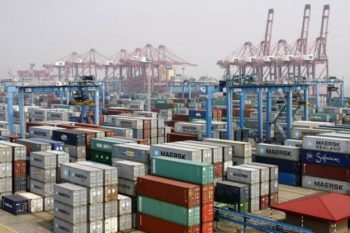
Turkey said on Wednesday it was hiking tariffs on imports of several key US products in retaliation for American sanctions against Ankara.
The bitter dispute between the two allies that sent the Turkish lira into freefall showed no sign of ending.
The lira — which had lost just under a quarter of its value in trade on Friday and Monday — however continued to claw back some ground on financial markets, rallying over five percent against the dollar.
The lira’s fall had raised fears Turkey was on the verge of a fully-fledged economic crisis, especially in its banking system, that could spill over into Europe and other markets.
Turkish Vice President, Fuat Oktay, said that the tariff hikes were ordered “within the framework of reciprocity in retaliation for the conscious attacks on our economy by the US administration”.
President Donald Trump had previously announced that the US was doubling steel and aluminium tariffs on Turkey, as the two NATO allies row over the detention by Turkish authorities of American pastor, Andrew Brunson.
The hikes were published in Turkey’s Official Gazette in a decree signed by President Tayyip Erdogan, who has repeatedly described the crisis as an “economic war” that Turkey will win.
The tariff increases amount to a doubling of the existing rate, the state-run Anadolu news agency said, in an apparent parallel response to Trump’s move.
The decree said the move brought tariffs to 50 percent on imports of US rice, 140 percent on hard alcoholic drinks like spirits, 60 percent in leaf tobacco and 60 percent on cosmetics.
The tariffs on auto imports are now up to 120 percent, depending on the type of vehicle.
Erdogan on Tuesday said Turkey would boycott US electronic goods like iPhones, even though he has himself been photographed repeatedly using the product himself.
He also made his now famous speech on the night of the July 2016 failed coup calling citizens out into the street through FaceTime, an iPhone app.
Moves by the central bank to ensure Turkish banks have liquidity and a planned conference call by Turkish Finance Minister, Berat Albayrak, who is Erdogan’s son-in-law on Thursday have gone some way to giving reassurance to investors.
The lira was trading on Wednesday at 6.02 to the dollar, a gain in value on the day of 5.5 percent.
But many analysts say the only way for the authorities to show they are really serious about tackling Turkey’s economic problems — which include inflation approaching some 16 percent — would be a sharp rate hike.
“Significantly more than just official promises of action are needed to exit the current crisis,” said Andy Birch, principal economist at IHS Markit, calling for “a sharp central bank rate rise”.
Turkey has meanwhile resisted pressure to release Brunson — who has been held for two years and is currently under house arrest — with officials warning it could face further sanctions.
A court in the western Turkish city of Izmir rejected a new appeal to free Brunson on Wednesday, the state television TRT reported.
Erdogan has warned Turkey could seek alternative partners pointing to Ankara’s strong ties with Russia, Iran and China.
The president is due to meet with the emir of gas-rich Qatar, one of Turkey’s very closest allies on Wednesday.
Turkish officials have also been keen to emphasise that Ankara wants to retain strong ties with Europe, which has also expressed deep unease with Trump’s trade policies.
A Turkish court Tuesday released two Greek soldiers detained since March on espionage charges for illegally crossing the border in a case that has stoked tensions with Brussels.
Agency Report